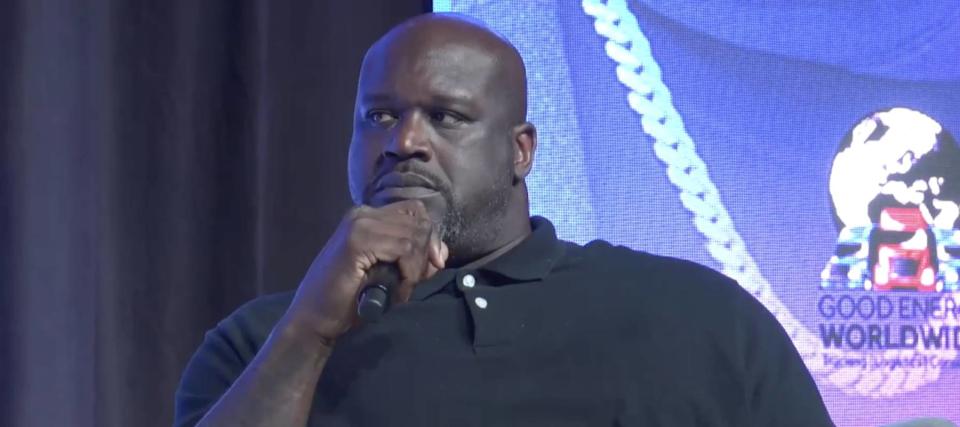
If the average American had a $1 million dollar windfall, how might they spend that money in a single day? After all, it’s nearly 13 times greater than the median U.S. household income, according to the Federal Reserve.
For NBA legend Shaquille O’Neal, it was as if he had a wish list ready to go before the money even hit his bank account.
Don’t miss
-
Commercial real estate has beaten the stock market for 25 years — but only the super rich could buy in. Here’s how even ordinary investors can become the landlord of Walmart, Whole Foods or Kroger
-
Car insurance premiums in America are through the roof — and only getting worse. But 5 minutes could have you paying as little as $29/month
-
These 5 magic money moves will boost you up America’s net worth ladder in 2024 — and you can complete each step within minutes. Here’s how
During a guest stint on an episode of the financial literacy podcast, Earn Your Leisure, Shaq revealed how he’d once depleted his bank account on luxury purchases because he wasn’t aware some of his earnings were earmarked for taxes.
“I don’t know no motherf–king FICA. They took [something like] $200,000!” he recalled thinking at the time.
Here’s how the experience shaped Shaq’s perspective on money and wealth-building.
Money blindspots
In 1999, Nobel Prize-winning behavioral economist Richard Thaler of the University of Chicago developed the concept of “mental accounting” which he described as “cognitive operations used by individuals and households to organize, evaluate, and keep track of financial activities.”
In other words, people create mental baskets for different sources of income and earmark this money for different types of spending activities.
This irrational system of mental accounting can lead to bad financial outcomes, including the “windfall effect” where a sudden influx of cash is treated less seriously than regular income.
This windfall bias could be the reason why Shaq splurged on his seven-figure paycheck faster than he’d anticipated.
“My agent called me and said, ‘Hey, I got a check for a million,’” he recalled. “You know me, I already had that black Mercedes lined up.”
After purchasing the luxury car for $150,000, Shaq was talked into buying two more — one for each of his parents. He also added some jewelry and suits to his growing bill that day.
Shaq’s mental accounting led him to believe he had plenty of money left over. “I get a call from the bank manager and he says, ‘you spent a million dollars,’ [and] I said, ‘No, I didn’t.’”
However, after looking through his statements, Shaq realized a significant chunk of his paycheck had gone to payroll taxes under the Federal Insurance Contributions Act (FICA).
“I had no idea what FICA, and income, state tax, sales tax [were],” he confessed. “So then I said, ‘Okay, I don’t want to be like the rest of these NBA players, I got to teach myself.’”
It’s unclear how much Shaq actually lost to FICA taxes. The former pro doesn’t say when he went on his shopping spree, but in 2024, FICA taxes equal to 15.3% of your pay — 7.65% comes off your pay, while your employer is responsible for ponying up the other 7.65%. Self-employed people are on the hook for the entire 15.3%.
With this fresh perspective, Shaq diligently saved his paychecks, made savvy investments in diversified business ventures and built a fortune that is now worth roughly $500 million, according to CelebrityNetWorth.
A similar shift in mindset could help the average savers and investors too.
Read more: Car insurance rates have spiked in the US to a stunning $2,150/year — but you can be smarter than that. Here’s how you can save yourself as much as $820 annually in minutes (it’s 100% free)
Better budgeting
According to the 2023 BMO Real Financial Progress Index, 68% of Americans have no written financial plan in place.
Without a concrete plan, many may find themselves relying on mental accounting to manage their expenses.
For instance, 67% of taxpayers expect to receive a tax refund in 2024, and nearly 30% of them plan to spend that money on activities such as vacations, home improvements, and retail splurges, according to Bankrate.
This means an unexpectedly large tax refund could be used for conspicuous consumption by many Americans, as opposed to saving and investing.
By planning ahead, you can optimize your finances and prepare for unexpected windfalls and expenses.
A savvy financial adviser can help you optimize further by helping you file your taxes earlier, estimate how much you might owe (or receive), and figure out where you can invest excess cash flow from various sources to meet your financial goals as early as possible.
When it comes to long-term financial planning, ditch the mental math and fire up a spreadsheet instead.
Update — Aug. 16, 2024: This story now clarifies that it’s unclear exactly how much Shaquille O’Neal lost solely to FICA taxes.
What to read next
This article provides information only and should not be construed as advice. It is provided without warranty of any kind.

Based in New York, Stephen Freeman is a Senior Editor at Trending Insurance News. Previously he has worked for Forbes and The Huffington Post. Steven is a graduate of Risk Management at the University of New York.

